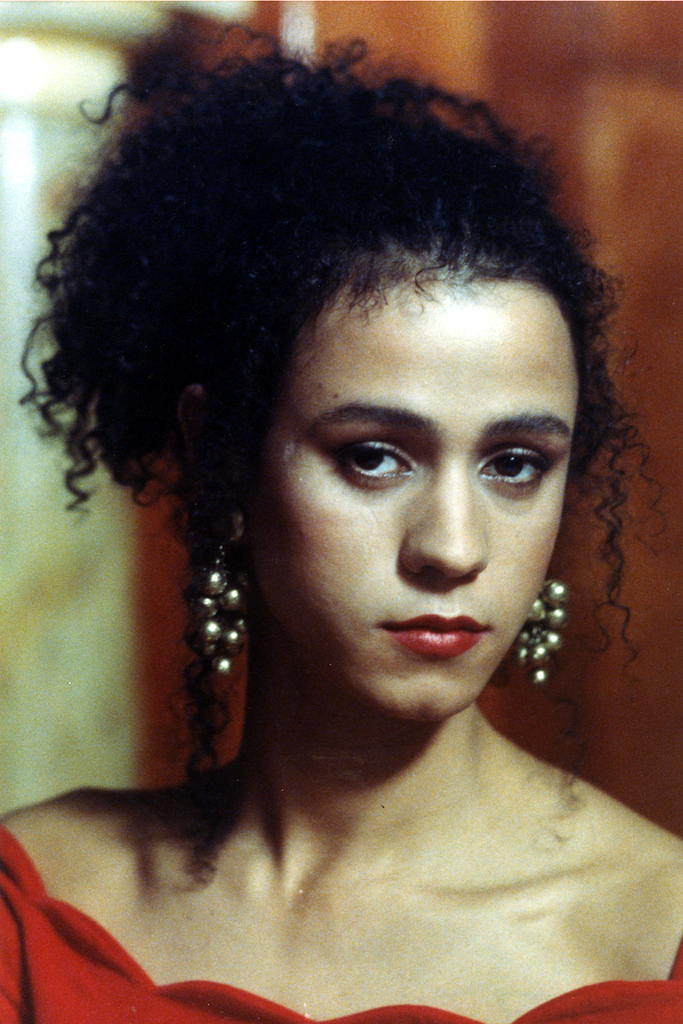Jaye Davidson: From "The Crying Game" To Fashion Icon
Can a single role, a debut performance, truly define a career and alter the course of a life? For Jaye Davidson, the answer is a resounding yes. His portrayal of Dil in Neil Jordan's 1992 thriller, The Crying Game, not only catapulted him to international fame but also set in motion a series of events that shaped his subsequent trajectory in ways no one could have predicted.
Born Alfred Amey in Riverside, California, on March 21, 1968, Davidson's life took a dramatic turn when he was cast as Dil, a transgender woman, in The Crying Game. The film, a complex and controversial exploration of identity, love, and betrayal, earned Davidson an Academy Award nomination for Best Supporting Actor, a remarkable feat for a newcomer with no prior acting experience. This recognition was just the beginning of a short but impactful journey through the world of cinema, followed by a successful, though less publicized, career in fashion.
| Full Name: | Alfred Amey (Known as Jaye Davidson) |
| Date of Birth: | March 21, 1968 |
| Place of Birth: | Riverside, California, USA |
| Nationality: | British-American |
| Occupation: | Model, Fashion Stylist, Retired Actor |
| Known For: | Role as Dil in The Crying Game (1992) and Ra in Stargate (1994) |
| Partner: | Thomas Clarke (Married) |
| Years Active: | 1992-1994 (Acting); Continued in fashion |
| Awards/Nominations: | Academy Award Nomination for Best Supporting Actor ( The Crying Game) |
| Family: | Ghanaian Father, English Mother |
| Education: | Left school at 16 |
| Current Residence: | Paris, France |
The impact of The Crying Game on Davidson was immediate. He became an overnight sensation, thrust into the glare of the spotlight. Director Neil Jordan, who recognized Davidson's unique quality, describes him as a "happy and healthy man" who made significant life changes. He was a fashion icon, known for his androgynous look and striking features, further solidifying his place in the public eye.
Following the success of The Crying Game, Davidson took on the role of the villainous Ra, the sun god, in the science fiction blockbuster Stargate (1994). While the film itself was a commercial success, it marked the end of Davidson's acting career. He made the decision to step away from Hollywood, a choice he later attributed to his discomfort with the pressures of fame. Davidson himself mentioned that he "genuinely hated the fame".
It's amazing to consider how someone with no prior acting experience could deliver such a captivating performance. Stephen Rea, who starred alongside Davidson in The Crying Game, described it as "amazing it happened at all". The film was the only one in production in England or Ireland at that time. The film's success was also supported by the cultural context of the time and the movie's unconventional themes.
His transition from acting to fashion was seamless. With his keen eye for style and a natural understanding of aesthetics, Davidson found success as a fashion model and stylist. He worked with top models and photographers, further expanding his creative horizons. He moved to Paris, where he has continued to live, enjoying a life away from the relentless scrutiny of the entertainment industry. His move also allowed him to focus on his personal life, including his marriage to Thomas Clarke.
Davidson's story is a testament to the unpredictable nature of fame and the importance of choosing one's own path. His career, though brief in terms of screen time, left a lasting impression. His ability to embody the transgender character, Dil, with such sensitivity and nuance, not only earned him critical acclaim but also challenged societal norms. His subsequent decision to retreat from the spotlight is a bold statement about prioritizing personal well-being over the allure of celebrity.
Jaye Davidson's story is a lesson in authenticity. He navigated the complexities of his sudden fame with remarkable grace, utilizing his platform to challenge societal norms. His journey is a compelling reminder that life, like a well-crafted film, can take unexpected turns, and that the most fulfilling roles are often the ones we choose for ourselves.
While The Crying Game remains his most well-known work, Davidsons impact goes beyond the screen. He challenged the perception of gender and sexuality, becoming an icon of acceptance. His legacy is one of artistic expression, and the courage to redefine success on his own terms. The film's themes of identity and acceptance continue to resonate with audiences, solidifying its place as a timeless piece of cinema.
The actor's journey from his Californian roots to his success in England and the subsequent move to France, underscores the global nature of artistic endeavor. His story is proof that one can redefine oneself, from the high-profile career to a more private, personal one. His choices reflect a commitment to personal well-being.
Davidsons choices after Hollywood reflect a commitment to personal fulfillment. He walked away from a profession which can be relentless. For someone who was not seeking fame, it showed his commitment to a life of his own terms.
His story continues to be a source of inspiration. Despite his departure from the public eye, Davidson's influence remains. For those who experienced his work, it has left a lasting impression, continuing to challenge perspectives on identity and personal expression.
Jaye Davidson's narrative is a captivating blend of artistic achievement and personal choice. His legacy continues as a testament to the power of self-determination and the enduring impact of genuine artistic expression.
Though his time in the spotlight was relatively short, Jaye Davidson has earned a place in film history and, perhaps more importantly, has lived a life on his own terms. His choices show the importance of self-discovery and prioritizing one's own well-being.
The legacy of Jaye Davidson is that of an individual who possessed immense talent, embraced opportunity, and ultimately, remained true to himself. His path, from Hollywood to the world of fashion and beyond, is a reminder that success is not always defined by public recognition but by the choices we make to live our best lives.
In an industry often characterized by its fleeting nature, Davidson's story is a reminder of the importance of artistic integrity and the courage to follow one's own path. He continues to be an influential figure, a testament to the power of self-expression and personal agency.
The cultural impact of The Crying Game can't be ignored. The film's story highlighted the challenges faced by transgender people, adding to the social narrative of the time. Davidson's role as Dil was groundbreaking, allowing audiences to see a sensitive portrayal of a transgender woman on screen.
Davidson's acting career was brief, yet it left an indelible mark on the film industry. He made a lasting impression with the performance in The Crying Game. His portrayal of Dil brought attention to the challenges faced by the LGBTQ+ community.
The Academy Award nomination received by Jaye Davidson showed that his performance was appreciated by critics and the audience. His work paved the way for future film projects on gender and identity. His choice to leave the acting world highlights his personal decisions and his commitment to living life on his terms.
His success in the fashion industry shows that one can find success in different fields. He showed the world that one can choose one's own path.
For more information about Jaye Davidson and his career, you can check out resources like IMDB.


